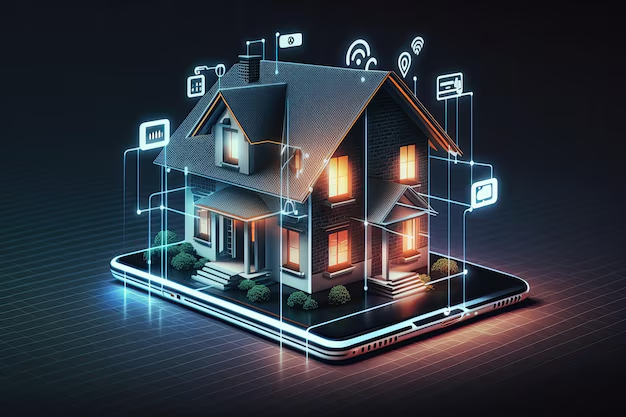The world of real estate has always been dynamic, but with recent advancements in technology, it’s undergoing a transformation like never before. Real estate technology, or “proptech,” has revolutionized the way people buy, sell, invest in, and manage property. This change has created opportunities for buyers, sellers, and investors while also offering innovative tools that make real estate processes more accessible, transparent, and efficient. From artificial intelligence (AI) to blockchain, the real estate industry is embracing tech-driven solutions that enhance experiences for all parties involved. In this blog, we’ll explore how real estate technology is revolutionizing the industry and why it’s reshaping the future of property.
The Rise of Real Estate Technology

Real estate technology has rapidly grown over the last decade, moving from basic listing platforms to sophisticated tools that allow people to buy, sell, or rent property with ease. Many areas in real estate, like residential and commercial property management, financing, and investment, have all embraced this technology-driven change. Companies are investing in tech solutions to create more efficient business models, streamline operations, and offer a better customer experience. As technology advances, the boundaries of what’s possible in real estate continue to expand, and we’re seeing groundbreaking changes that make real estate transactions faster and simpler.
Key Real Estate Technologies Transforming the Industry

1. Artificial Intelligence (AI) and Machine Learning (ML)
One of the most impactful advancements in real estate technology is the use of AI and ML. These technologies help real estate professionals gather and analyze vast amounts of data, allowing them to predict trends, evaluate property values, and make data-driven decisions. For instance:
- Property Valuation: AI algorithms can analyze market data, recent transactions, and neighborhood trends to provide accurate property valuations, helping buyers and sellers make informed decisions.
- Customer Experience: AI-powered chatbots and virtual assistants streamline customer service by answering frequently asked questions, scheduling appointments, and providing tailored recommendations for buyers and renters.
AI also assists in market forecasting, risk assessment, and even detecting fraud in transactions, adding layers of accuracy and safety that were once unattainable in real estate.
2. Virtual and Augmented Reality (VR/AR)
VR and AR have dramatically improved how people view properties. With virtual tours and augmented reality, potential buyers or renters can “walk through” a property without being physically present. This innovation has gained popularity, especially during the COVID-19 pandemic, allowing people to view properties remotely from anywhere in the world. VR and AR offer several benefits:
- Accessibility: Buyers from other states or countries can explore properties without travel costs.
- Enhanced Experience: AR features allow prospective buyers to see how a space might look with furniture, art, or even specific lighting conditions.
- Better Decision-Making: By providing an immersive experience, these tools help people get a better sense of a property’s layout and ambiance.
Blockchain in Real Estate: Creating Transparency and Security

Blockchain, the technology behind cryptocurrencies like Bitcoin, has found a valuable place in real estate as well. Blockchain offers a transparent and secure way to record and track transactions, which can be a game-changer in property transactions. Here’s how blockchain impacts real estate:
- Smart Contracts: Blockchain enables the use of smart contracts, which are digital agreements that automatically execute when certain conditions are met. Smart contracts reduce the need for intermediaries and help speed up the buying and selling process.
- Enhanced Security: By using a decentralized ledger, blockchain reduces the risk of fraud and ensures that transaction records are immutable and transparent.
- Fractional Ownership: Blockchain technology allows for the concept of fractional ownership, where investors can own a fraction of a property. This opens up investment opportunities in high-value properties to a broader audience, making real estate investment more accessible.
Blockchain’s transparency and security are paving the way for more efficient and trustworthy property transactions, a shift that benefits both buyers and sellers.
The Role of Big Data and Analytics in Real Estate Technology

Big data and analytics are fundamental in real estate technology. Real estate companies now have access to extensive data that provides insights into market trends, consumer preferences, and property values. Big data benefits the industry in several ways:
- Market Prediction: With analytics tools, companies can analyze historical and current market trends to predict future property values and investment opportunities.
- Targeted Marketing: Data analytics helps companies understand their target audience and tailor their marketing efforts to reach potential clients more effectively.
- Risk Management: Data-driven insights allow investors to evaluate the risks associated with specific properties or neighborhoods, making it easier to make strategic investment decisions.
By using big data, real estate professionals can make more accurate predictions and offer clients insights that were previously unavailable. This data-driven approach empowers both buyers and sellers to make better choices in the marketplace.
Real Estate Technology in Property Management

Property management is another area that’s benefiting from advancements in real estate technology. Technology helps property managers streamline operations, reduce costs, and provide a better experience for tenants. Some ways technology is improving property management include:
- Smart Home Technology: Property managers can offer smart features like automated lighting, security systems, and thermostat controls, adding convenience and energy savings for tenants.
- Maintenance Management: Technology solutions now allow tenants to submit maintenance requests via apps, and property managers can track and manage these requests efficiently, improving response times and tenant satisfaction.
- Payment Processing: Online payment systems enable tenants to pay rent digitally, and property managers can easily track and manage payments, reducing late payments and administrative burden.
With property management software, landlords and property managers can oversee multiple properties with ease, making it easier to scale operations while maintaining high service standards.
Real Estate Technology: Shaping the Future of Investment

For investors, real estate technology has opened up new avenues for investment and simplified the process of managing assets. Crowdfunding platforms, for example, enable small investors to pool funds and participate in large-scale real estate projects. Additionally, technology has enabled real estate investment platforms that offer a wide range of property investment options. Here’s how real estate technology is influencing the future of investments:
- Increased Access to Investments: Technology platforms offer investors easy access to various property types and markets that were previously hard to reach.
- Real-Time Analytics: Investment platforms provide real-time data and analytics, helping investors monitor their investments and make informed decisions.
- Lower Barriers to Entry: Crowdfunding and fractional ownership make it possible for smaller investors to participate in lucrative property investments, increasing the diversity of investors in the market.
With such tools, investors can access high-quality data, diversify their portfolios, and even manage their investments from a single platform, marking a huge leap from traditional real estate investing.
Conclusion: The Ongoing Revolution of Real Estate Technology
Real estate technology is undeniably transforming the industry, creating a landscape that’s faster, more efficient, and more accessible. From AI-driven analytics to blockchain’s security and transparency, each advancement is reshaping the way people interact with real estate. For buyers, sellers, property managers, and investors alike, the adoption of real estate technology is not only a trend but an essential adaptation to remain competitive in today’s digital age.
As the industry continues to evolve, we can expect further innovations that will enhance the real estate experience, making it easier for people to engage in property transactions, manage assets, and make smart investments. The future of real estate is bright, thanks to technology, and it promises a new era of opportunity, inclusivity, and growth.







